|
|
|
Sort Order |
|
|
|
Items / Page
|
|
|
|
|
|
|
| Srl | Item |
| 1 |
ID:
090404
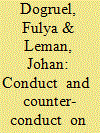

|
|
|
|
|
| Publication |
2009.
|
| Summary/Abstract |
Due to its particular border situation and historical past, Antakya (in south-central Turkey) has, in contrast to most cities in Turkey, been successful in protecting important components of its diachronically composed multiculturalism. In light of such qualities Antakya is able to permit a diachronic analysis of different subsequent 'governmentalities' (Foucault) and flexible network formations that reflect the various processes in government styles in twentieth century Turkey. Through participant observation and in-depth interviews the authors try to reconstruct the diachronic multiculturalism from a perspective of macro- and micro-powers, 'conduct' and 'counter-conduct'.
|
|
|
|
|
|
|
|
|
|
|
|
|
|
|
|
| 2 |
ID:
090399
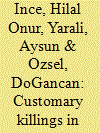

|
|
|
|
|
| Publication |
2009.
|
| Summary/Abstract |
Rather than reducing the problem to ethno-cultural characteristics, we explain the persistence of customary killings in Turkey through the shortcomings of the Turkish modernization project. As we argue, the problem persists because of the failure of modernization to have a real impact on rural regions, and of the conceptualization of woman by the modernizing elite as an object to be moulded. Also, by utilizing proverbs and novels we address the prevalent patriarchal culture which endorses customary killings but, far from being problematized, it is even promoted by this project. Alternatively, we propose a more critical and deliberative modernization
|
|
|
|
|
|
|
|
|
|
|
|
|
|
|
|
| 3 |
ID:
090401
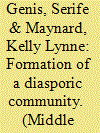

|
|
|
|
|
| Publication |
2009.
|
| Summary/Abstract |
As the successor to the multi-ethnic, multi-religious Ottoman Empire, modern Turkey inherited many non-Turkish-speaking Muslim communities. This article is concerned with Albanians in Turkey, one of the Muslim communities which migrated in large numbers to Anatolia during and after the dissolution of the Ottoman Empire to escape conflict and massacre in the Balkans. Based on historical studies and oral history interviews, we account for the Albanian migration to Turkey during the 1912-13 Balkan Wars and demonstrate the formation and transformation of an Albanian community in Samsun Province in the Black Sea.
|
|
|
|
|
|
|
|
|
|
|
|
|
|
|
|
| 4 |
ID:
090409
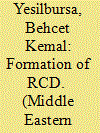

|
|
|
|
|
| Publication |
2009.
|
| Summary/Abstract |
The Regional Co-operation for Development (RCD) was set up by the regional members of the Central Treaty Organization (CENTO), Iran, Turkey and Pakistan, in July 1964 to strengthen their socio-economic development. However, a number of financial, political and administrative difficulties made progress under RCD slow. Despite assurances to the contrary, the probable impetus behind the formation of RCD was the unease with the politico-military aspects of CENTO. However, RCD's political significance grew steadily, and that of CENTO declined correspondingly. Nevertheless, recognizing that RCD could not provide an effective military substitute, Iran and Turkey still attached value to CENTO. After twelve unsatisfactory years, the three regional Heads of State held a summit in Izmir on 22 April 1976, making amendments to the 1964 declaration. The Treaty of Izmir was signed in 1977 as the legal framework for RCD. Yet, RCD was unsuccessful. In January 1985, Turkey, Iran and Pakistan established a new organisation called the Economic Co-operation Organization (ECO).
|
|
|
|
|
|
|
|
|
|
|
|
|
|
|
|
| 5 |
ID:
090402
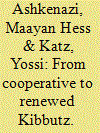

|
|
|
|
|
| Publication |
2009.
|
| Summary/Abstract |
This article deals with the process of change which is taking place in the kibbutz movement of Israel, and the structural and organizational changes in most kibbutzim from the model of a cooperative kibbutz to that of a renewed kibbutz. The article deals with the causes of the crisis and the principles of change, the essence of which is the implementation of the idea of economic rationalism. This change is not total nor is it accompanied by a denial of the fundamental values of kibbutz but it has many forms and takes place at different rates in accordance with the characteristics of each economic unit and each community. The research focuses on Kibbutz 'Galil' as a test case of a kibbutz which has undergone drastic change against the backdrop of a serious economic crisis and thus it represents an extreme example of a kibbutz which has moved completely to the model of a renewed kibbutz, constituting a signpost for other kibbutzim.
|
|
|
|
|
|
|
|
|
|
|
|
|
|
|
|
| 6 |
ID:
090410
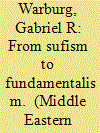

|
|
|
|
|
| Publication |
2009.
|
| Summary/Abstract |
Both the Wahhabiyya and the Mahdiyya were based on different styles of tajdid (renewal). The Mahdiyya was based on the charisma of its leader and was a leader oriented tajdid movement. The Wahhabiyya, on the other hand, was a message oriented movement, which viewed Sufism with hostility. In contrast to Sufi traditions, which embraced al-Mahdi al-Muntazar, who claimed that he was _Khalifat Rasul Allah, Ibn 'Abd al-Wahhab embraced tawhid (Unitarianism), as his guiding message. Consequently, the neo-Mahdiyya, which emerged during the twentieth century, shied away from radicalism, and became part of the Sudanese Political establishment. The Wahhabiyya, on the other hand, maintained its tajdid message, and gradually emerged as part of the Jihad oriented, Islamic fundamentalism.
|
|
|
|
|
|
|
|
|
|
|
|
|
|
|
|
| 7 |
ID:
090407
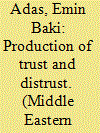

|
|
|
|
|
| Publication |
2009.
|
| Summary/Abstract |
This article examines the role and effects of the state on the operation of social capital through a case study of Islamic holding companies in Turkey and their social networks within transnational space. In the last two decades, there has been a proliferation of Islamic enterprises, banks and holding companies which formed their own business organization in 1990. The capital outlay of these holding companies was created, without any legal basis, through mobilizing the savings of hundreds of thousands of pious small savers in Turkey and across Europe. While the state actors initially overlooked, at times encouraged, this mobilization of savings, the development of political Islam in the 1990s raised a concern that political Islam along with its economic base and power posed a significant threat to the secularist political regime. Consequently, the secularist state elites actively intervened in both domestic and transnational spheres to disrupt and undermine these networks which provided monetary inflows into these companies. The intervention and campaigns of the state in Turkey and Europe led to bankruptcy of several Islamic holding companies, exposed the mismanagement of fund by some companies and resulted in widespread distrust toward Islamic holding companies among small local and migrant investors.
|
|
|
|
|
|
|
|
|
|
|
|
|
|
|
|
| 8 |
ID:
090405
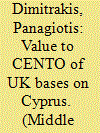

|
|
|
|
|
| Publication |
2009.
|
| Summary/Abstract |
The British sovereign bases on Cyprus, granted with the 1960 treaty establishing the Republic of Cyprus, played a key role in maintaining the fragile military structure of the Central Treaty Organization (CENTO). Although Britain and the United States urged the alliance to play a more active role, CENTO degenerated into an organization with no assigned forces with the exception of RAF bombers carrying nuclear weapons, stationed on Cyprus. Thus, Britain's contribution in political and military terms became vital for CENTO's deterrence capability. The Shah of Iran, one of the key regional leaders, was interested in the RAF bombers on Cyprus; the FCO and the MoD were always cautious over how force restructuring would be presented to the Iranians. Eventually, the need for cutting defence spending for non-NATO purposes made Whitehall decide in 1975 to withdraw the bombers permanently based in Cyprus. Britain could not be the only power paying for this 'alliance of the unwilling', as CENTO could be called with the benefit of hindsight. In 1976, Whitehall started scaling down financial support of military exercises; by 1983 they had planned to spend nil on the alliance. The British disengagement policy proved the correct one since this alliance had only a few years of life left. After the fall of the Shah, CENTO collapsed in 1979.
|
|
|
|
|
|
|
|
|
|
|
|
|
|
|
|
|
|
|
|
|